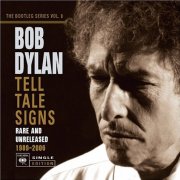 With the temperature dropping, it's time to find someone to keep you warm. Find your hookups with our online dating guide!
With the temperature dropping, it's time to find someone to keep you warm. Find your hookups with our online dating guide!
Tell Tale Signs:
The Bootleg Series Vol. 8
Rare and Unreleased
1989-2006
- Folk/Rock
- 2008
- Buy the CD
Reviewed by Michael Fortes
()
This version of Dylan was born in 1989, when he finally seemed to be coming out of the artistic slump that dogged him through most of the 1980s. He left behind the brittle production that instantly dated poorly-received records like 1985’s Empire Burlesque and 1986’s Knocked Out Loaded to the Reagan era. And then he found Daniel Lanois. At that point, the Bob Dylan who didn’t follow leaders came back, and made Oh Mercy his first great record in more than a decade. With the exception of a short stumble with the Was brothers on the following year’s Under the Red Sky, Dylan has been on a roll ever since, moving at his own pace.
The beauty of Tell Tale Signs is that it reveals not just the staying power of Dylan’s reclaimed songwriting muse, but also his musical imagination. Sure, he’s deliberately forsaken current trends to make what he would call “archaic” music, but in doing so he is admitting publicly where his true musical allegiances lie – with gut-level, formative rock n’ roll, pop, Americana, and the folk tradition of borrowing and recasting in one’s own image. In other words, Dylan’s refusal to try out new sounds and styles is a good thing! Just ask anyone who was suckered into buying the last two Mick Jagger albums.
With this limited palette, he’s freed himself to try on different colors of the same suit for each song. “Mississippi” is an exciting example – it was first tried during the sessions for 1997’s Time out of Mind, and journeyed from a solo acoustic folk tune, to a swampy ballad, before it became the bouncy folk-rock highlight of Love and Theft in 2001. Both early versions are here, serving as the lead track of each of the set’s two discs (a third version appears on the super deluxe three-CD plus two hardcover book edition). Dylan’s notorious penchant for constantly rewriting lyrics is also shown to be a habit that hasn’t died. “Dreamin’ of You” rises to the top of the rewrite heap, with an expectedly dreamy track carrying the basic structure and many of the ideas that eventually morphed into Time out of Mind’s mournful “Standing in the Doorway.”
Dylan’s judgment is also called into question with the versions of “Born in Time” and “Someday Baby” presented here. The former, originally released on the competent but completely forgettable Under the Red Sky, comes off as nearly an equal to Oh Mercy’s “Where Teardrops Fall,” and no wonder – it was originally cut during the Oh Mercy sessions with Daniel Lanois. Lanois had a much better grip on Dylan’s strengths than the Was brothers, and this track proves it without a doubt. But it’s “Someday Baby,” produced by Dylan himself, that’s the real ear-opener. On 2006’s Modern Times, it was just another blues ripoff, albeit a good example of Dylan fashioning himself as a venerable, hardened bluesman. On the alternate version, Dylan marries his lyrical Willie Dixon-isms with a folkier, prettier chord progression. It goes down much smoother, and would have made the already blues-heavy Modern Times an even better, more diverse record than it was.
But since history can’t be rewritten, these Bootleg Series entries continue to be a godsend to those who wished things had been different, or get bored easily. There are so many more songs that could be raved about as “highlights”: the Ralph Stanley duet on “The Lonesome River”… the haunting soundtrack tune “’Cross the Green Mountain”… the never-before-heard song “Red River Shore”… the discarded lyrics that ended up in other songs… excellent live performances that will be appreciated by anyone who has caught Dylan having an off night at a concert… and that loose, teetering close to reggae take on ‘97’s “Can’t Wait”…
It’s a set that inspires, and with Dylan pal Larry “Ratso” Sloman’s liner notes, it brings us up to date with the proudly anachronistic enigma. His voice may be ragged, but his songwriting and record-making prowess is as strong as ever. Tell Tale Signs may be the best installment in the whole series since that initial three-volume set, if only for giving an even wider view of Dylan’s never-ending quest to bring his own unique sensibility to American musical traditions. This is one old man who can keep yappin’ all he wants, as long as he keeps crankin’ out records like these.
You can follow us on Twitter and Facebook for content updates. Also, sign up for our email list for weekly updates and check us out on Google+ as well.











